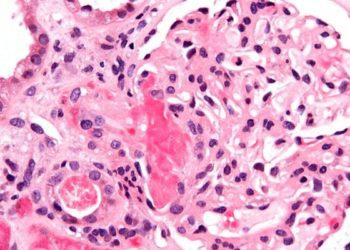Chronic kidney disease associated with increased risk of spontaneous intracranial hemorrhage
1. Chronic kidney disease was independently associated with an increased risk of spontaneous intracranial hemorrhage, regardless of race or ethnicity.
2. Genetically determined chronic kidney disease was also associated with increased intracranial hemorrhage risk.
Level of Evidence Rating: 2 (Good)
Study Rundown: Spontaneous, nontraumatic intracranial hemorrhage can be a devastating event which is often secondary to hypertension, vascular aneurysms or other malformations in the cerebral vessels. Previous studies have suggested an increased risk of ischemic stroke in individuals with chronic kidney disease (CKD) but the relationship between CKD and hemorrhagic stroke is less clear. The present study by Vanent et al combined observational and genetic data from a large cohort of individuals to assess the association between CKD and spontaneous, nontraumatic intracranial hemorrhage (ICH).
A total of 6,868 patients from the ERICH case-control study were included. The prevalence of CKD amongst cases was 4.3% and 1.3% amongst controls; this difference was statistically significant. Amongst the general population cohort of 502,536 individuals, 1341 patients with ICH were identified. The prevalence of CKD amongst patients with ICH was 6.4% and 1.9% amongst the non-ICH controls. Finally, 1078 genetically driven CKD cases were identified, which were also associated with an increased risk of ICH. Analysis of functional outcomes 3 months after intracranial hemorrhage demonstrated that patients with CKD had worse outcomes.
This observational study by Vanent et al demonstrated that individuals with CKD are at increased risk of dangerous cerebral hemorrhagic events and also at greater risk of poor function following ICH. These results are significant because they provide early rationale for screening for hypertension and related intracranial pathologies in patients with CKD. A strength of this study is the large sample size as well as the plausibility of the results reported based on previous study in this field. However, a primary limitation of this work is the potential for confounding: for example, patients with CKD are known to be relatively comorbid and this may additionally influence the risk of ICH. Considering this, further research is needed to better understand the mechanism underlying the association described in this study.
Click here to read this study in JAMA Neurology
Relevant reading: Chronic kidney disease and the risk of stroke: a systematic review and meta-analysis
In Depth [retrospective cohort]: A multi-step study was conducted. Observational data from ERICH case-control study of patients with CKD was collected retrospectively to assess for any association between CKD and ICH. This same analysis was then repeated in an ethnically diverse cohort derived from the general population. Finally, a Mendelian randomization genetic analysis was performed amongst this larger cohort to determine which patients with CKD had inherited disease, and whether this affected its relationship with ICH risk. Eligible patients in all phases of this study were adults living within 75 miles of a study recruitment center. Cases in the ERICH study had an image-confirmed diagnosis of ICH. Genetic analysis was performed using standard methods.
The analysis of the ERICH cohort confirmed that CKD was associated with an increased risk of ICH: in unadjusted analyses (odds ratio [OR], 3.35; 95% CI, 2.33-4.82) and adjusted analyses (OR, 1.95; 95% CI, 1.35-2.89). End stage kidney disease was associated with higher odds of ICH: in unadjusted analyses (OR, 5.44; 95% CI, 2.85-10.37) and adjusted analyses (OR, 2.93; 95% CI, 1.51-5.67). The analysis of patients in the general population demonstrated that CKD was associated with increased odds of ICH as well: in unadjusted analyses (OR, 3.60; 95% CI, 2.89-4.48) and adjusted analyses (OR 1.28; 95% CI, 1.01-1.62).
Genetically driven CKD was associated with increased odds of ICH even when using a conservative analytic approach (weighted-mean) yielding an odds ratio of 1.72 (95% confidence interval 1.06-2.82). The risk of poor functional outcome 3 months after intracranial hemorrhage was increased amongst individuals with CKD (58.8%) compared with those who did not have CKD (47.9%), p= 0.003. This association was not modified by race or ethnicity data.
Image: PD
©2022 2 Minute Medicine, Inc. All rights reserved. No works may be reproduced without expressed written consent from 2 Minute Medicine, Inc. Inquire about licensing here. No article should be construed as medical advice and is not intended as such by the authors or by 2 Minute Medicine, Inc.






